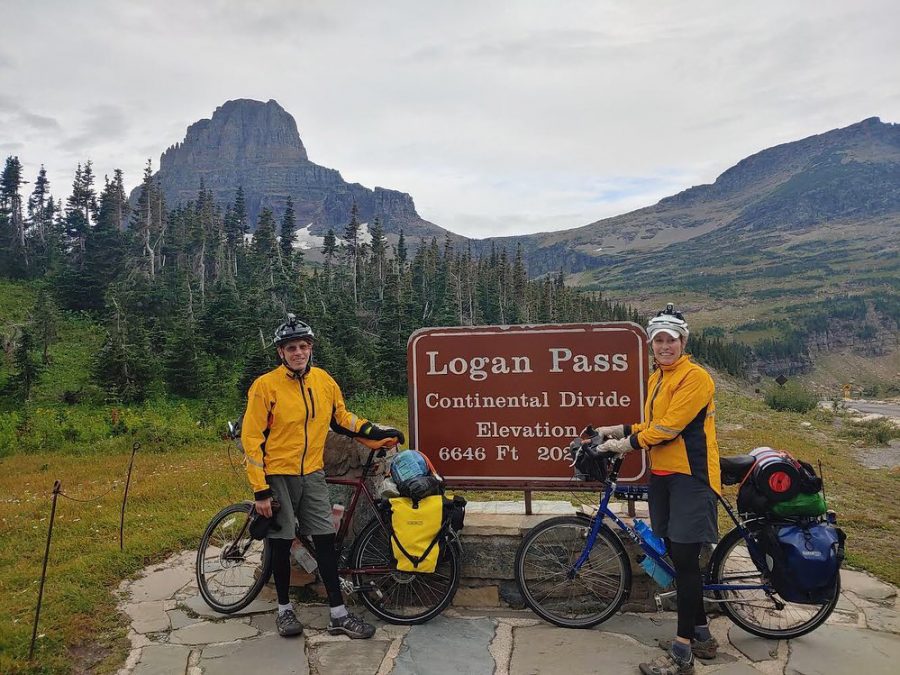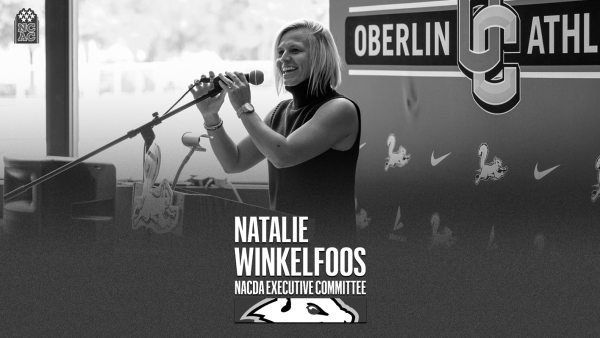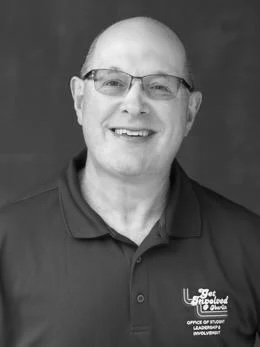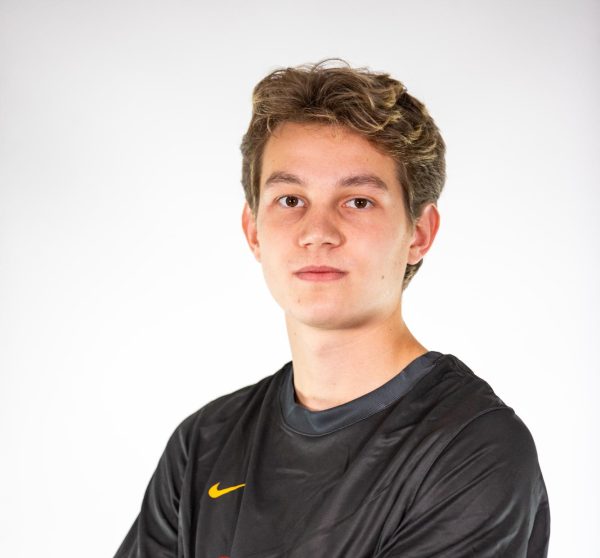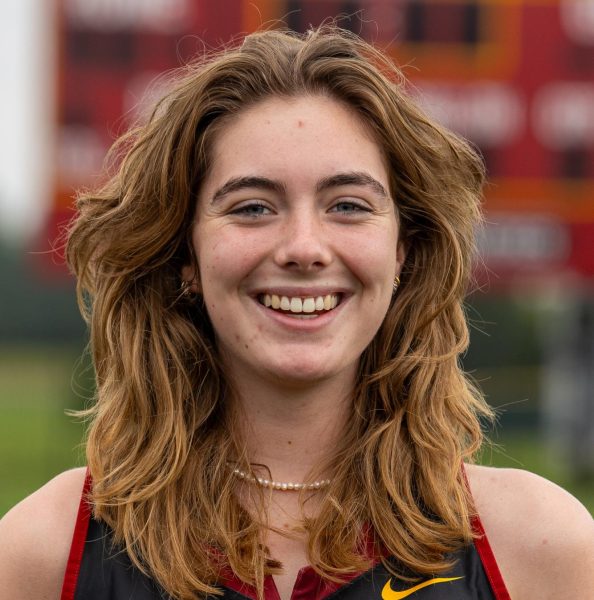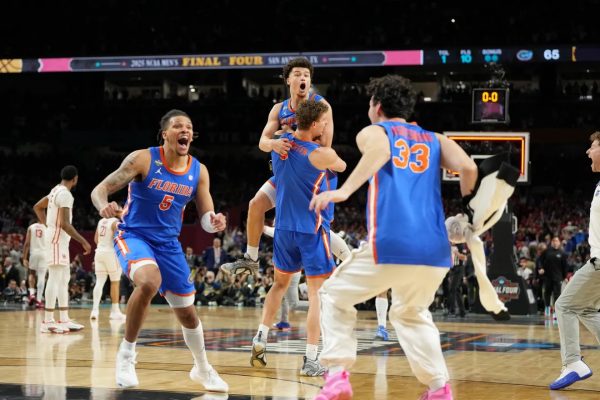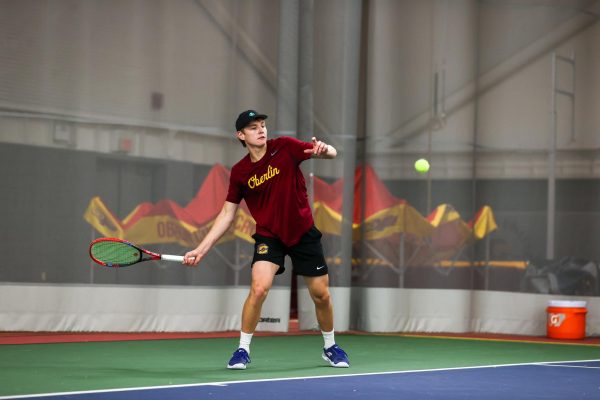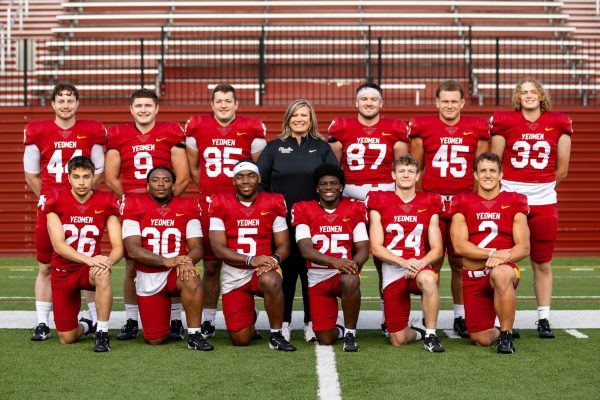Dave Tempest, OC ’72, Heisman Inductee
Dave Tempest Kathy Tempest, both OC ’72, during their 2,400 mile bike ride from Seattle Dave Tempest Kathy Tempest, both OC ’72, with students outside Shanks Health and Wellness Center. Photo courtesy of Oberlin Swimming and Diving to Oberlin.
Dave Tempest, OC ’72, is one of the former Oberlin student-athletes being in- ducted into the John W. Heisman Club Hall of Fame at a ceremony later today. While at Oberlin, Tempest was an All-American cross-country runner and swim-mer, and his wife, Kathy, also OC ’72, played women’s basketball in the pre-Title IX era. Dave and Kathy both arrived in Oberlin on Wednesday after biking from Seattle, WA, one of multiple cross-country bike trips that the couple has undertaken. After graduation, David spent two years in the U.S. Army, later got a Master’s degree in Exercise Physiology, and then went to medical school for Rehabilitation Medicine. The Heisman induction ceremony coincides both with this weekend’s Homecoming activities, as well as the Board of Trustees’ annual fall meeting.
This interview has been edited for length and clarity.
When did you start biking seriously?
My wife and I started to do bicycle tourism [when] our youngest kid went away to school and we realized we’d been raising kids for 30 years and had our professions and … it gave us a chance to be together. It turned out it was such a great experience that we’ve done it ever since. So, we would’ve ridden back [to Oberlin] anyway. We’re just looking for an excuse to go on a ride. Then being invited back for this Heisman award was just a nice touch. … I just said, “Hey, do you want to use the ride for a fundraiser for the Heisman Club and the sports teams?” And they did everything else, all we did was ride.
We’ve ridden because it’s just a great lifestyle. There’s a lot of exercise, but it’s not intense exercise. Everyone says, “Oh God, it’s like the Tour de France guys, right?” No, nothing like that. It’s like a walk, you know, you have to be able to be alone with your thoughts for a while because we don’t talk a lot. But really, you see a country in a way, you just can’t see it any other way. It’s really a great way to see the country. I think everybody would benefit from it. I think politicians ought to be required to do it. That’s my own personal opinion.
Is this the longest trip you’ve done?
No. Last year we went about 8,300 miles. We went from San Diego, [CA] to St. Augustine, [FL], then up to Philadelphia, [PA], and then back to Seattle. That took five months or so. That was the longest that we both — well, I’ve been retired — but Kathy was able to carve out a lot of time. So we … had to scratch an itch, that was kind of wanting to do that.
Do wild things ever happen on these long bike trips?
Lots of crazy stuff happens. You know, we went through Glacier [National Park], on Going-To-The-Sun Highway. It’s a beautiful highway … and we’re doing it at the end of August, and it’s just a zoo there with tourists. I mean, it’s just this big beautiful park. So we camped at the highest campground we could before the pass and got up at four in the morning and biked Going- To-The-Sun Highway at four in the morning. There was nobody there. You have no idea what you’re gonna run into. It’s a partial moon, so you get the mountain silhouetted, you’re going up this beautiful winding valley — it’s like the park’s your own, and it’s just magic. That was one.
The second would be, we were in Theodore Roosevelt National Park. We spent part of the day biking around and we were out looking for bison — didn’t see any. We’re riding back to the campground and come around a corner and there’s a van parked [on] a little narrow street, and then a bison sitting on the side grazing and it’s blocked off and we can’t get around the guy. So we have to go right by the bison. We stopped and thought about it for a while, but he looked definitely more interested in the grass than he was in us. So we got within a couple feet of him. It was kind of a treat because it’s such a beautiful animal, you don’t think about it, but it’s gorgeous. So there are lots of those types of things.
And the people along the way — I guess the land and the people are the two. It’s a big country. And [if ] you get to see [it at] the speed of a bike, it’s really nice. We find that we set a lot of stereotypes of what people are like around the country and they all get smashed. … So it’s been really helpful that way, to get a little more exposure to the country.
Is there a community of other people who do trips like this?
Oh yeah, we’re not special in the slightest. There’s a group called [the] Adventure Cycling [Association] in the United States that has about 52,000 members and they’ve mapped routes all over the country. So we don’t go on really busy highways a lot, like coming up from Columbus, we were on the greatest farm roads you ever saw. Ohio’s just this mile-by-mile grid of beautifully smooth-paved roads that [have] no traffic whatsoever.
This is the first time you’ve biked through Oberlin, right?
Yeah. Last year, we came down through Southern Ohio and we were kind of getting a little homesick and ready to get home so we didn’t take an extra 400 miles to do our own trip up through here. We thought about it but couldn’t pull the trigger.
The Heisman ceremony isn’t related to the biking, though, right? You just happened to arrive on a bike?
Yeah, we knew I was coming back because I’m part of the Heisman ceremony. So I knew we were coming back and it was just a question of how we got here.
What is the honor that you’re receiving from the Heisman Club?
The Heisman Club supports Oberlin athletics, and they have a selection process to put former athletes into their hall of fame. So [the athletes have] to be nominated and selected. I was a swimmer and cross country runner back in the day, late ’60s, early ’70s. My old coach nominated me, and for some reason the Heisman Club said, “Okay, yeah.” We have a little ceremony tomorrow … It’s really, really nice. It’s a great honor because it was very important to me — sports played a big role here, it was really helpful to me.
What else are you doing while you’re here besides the Heisman ceremony?
It’s a chance to catch up … we got a lot of alumni coming in that we’ll catch up with. My wife, Kathy, hasn’t been back since 1972 or so … so it’s been 47 years since she’s been here. … She played basketball before Title IX — that’s the biggest difference I note [on campus]. I think that she’s come back and she’s seen the richness of our sporting tradition, because I’ve been meeting with friends and having dinner with folks and she said, “Wow, I never got that.” And it’s true because it didn’t exist for her. They had a basketball program that was just starting and no one had experience so it was really rough around the edges. But there were no women in cross country, there were no women in swimming, there were no women in sports. I mean, I guess there was a field hockey team. So Title IX has made a huge difference.
And it was my coach that helped break that down in 1973. He had some women ask if they could train with the cross country team. He said sure, you know, and so they trained and they said, “Well, can we [race]?” And he said, “Well, you can’t run as scoring points, but you can certainly run exhibitions. Yeah, fine, let’s do it.” He took the team to Ohio Wesleyan [University] and the coach protested, pulled his team, and the guy said either don’t run the women or I’m not running my guys. And [my coach] said, “Well, they trained, they’re going to run.” So they ran, and the Ohio Wesleyan [University] coach filed a protest with the Ohio athletic conference because a regulation said the sporting goods were for men in good standing.
That went to the Ohio athletic conference committee meetings and the next year they changed the wording — that was right before Title IX. … That was the era back then, that things were just starting to open up.
What are some of your favorite memories of Oberlin athletics?
Oh, there are several. I actually break it down into three. I think the mentorship that the coaches had, because you spend more time with your coach than [anyone]. I mean, he coached cross country and swimming and so I had him pretty much year round, and he was just a very competent, capable person. He was my mentor. I loved the professors here, but I didn’t spend that much time with them. [Second], the team experience just made it so much richer. You just got exposed to stuff that you wouldn’t get exposed to in the classroom, and it’s not for everybody, there’s other ways to get meaningful experiences, but that was a really good one for me.


